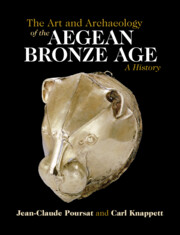Book contents
- The Art and Archaeology of the Aegean Bronze Age
- The Art and Archaeology of the Aegean Bronze Age
- Copyright page
- Contents
- Figures
- Introduction
- Part I Aegean Neolithic Art
- Part II The Art of the Aegean Early Bronze Age
- Part III Aegean Art in the Cretan First Palace Period
- Part IV Aegean Art in the Second Palace Period
- Part V Aegean Art in the Cretan Second Palace Period
- Part VI Aegean Art in the Final Palatial Period of Knossos
- Part VII Aegean Art of the Mainland Mycenaean Palatial Period
- Chapter 41 Artworks in Context
- Chapter 42 Architecture
- Chapter 43 Mycenaean Painting
- Chapter 44 The End of Aegean Glyptic
- Chapter 45 Mycenaean Ivories of LH IIIA2–B
- Chapter 46 Other Relief Arts
- Chapter 47 Mycenaean Art and ‘International Art’
- Chapter 48 Artworks in the Round
- Chapter 49 Pottery Production
- Part VIII Aegean Art at the End of the Bronze Age
- Afterword Aegean Art Through Forgers’ Eyes
- References
- Index
- Plate Section (PDF Only)
- References
Chapter 46 - Other Relief Arts
Goldwork, Glass, Faience, and Stone
from Part VII - Aegean Art of the Mainland Mycenaean Palatial Period
Published online by Cambridge University Press: 19 May 2022
- The Art and Archaeology of the Aegean Bronze Age
- The Art and Archaeology of the Aegean Bronze Age
- Copyright page
- Contents
- Figures
- Introduction
- Part I Aegean Neolithic Art
- Part II The Art of the Aegean Early Bronze Age
- Part III Aegean Art in the Cretan First Palace Period
- Part IV Aegean Art in the Second Palace Period
- Part V Aegean Art in the Cretan Second Palace Period
- Part VI Aegean Art in the Final Palatial Period of Knossos
- Part VII Aegean Art of the Mainland Mycenaean Palatial Period
- Chapter 41 Artworks in Context
- Chapter 42 Architecture
- Chapter 43 Mycenaean Painting
- Chapter 44 The End of Aegean Glyptic
- Chapter 45 Mycenaean Ivories of LH IIIA2–B
- Chapter 46 Other Relief Arts
- Chapter 47 Mycenaean Art and ‘International Art’
- Chapter 48 Artworks in the Round
- Chapter 49 Pottery Production
- Part VIII Aegean Art at the End of the Bronze Age
- Afterword Aegean Art Through Forgers’ Eyes
- References
- Index
- Plate Section (PDF Only)
- References
Summary
With the exception of the simplest jewellery, the decline in precious metal objects in both tombs and palaces stands out in relation both to the preceding tradition and to the gold riches found at contemporary Near Eastern sites: for example, the royal tomb of Qatna on the Orontes, or the treasures of Tell el-Ayyul in the Levant. On Cyprus, a piece such as the famous falcon sceptre with inlaid decoration from Kourion could hardly be Mycenaean: neither the object itself, nor the falcon symbolism, nor the use of glass in various colours have Aegean parallels (E. Goring, in Morris 1995, 103–10). The strikingly beautiful gold pomegranate pendant from Enkomi, often considered to be Mycenaean, is probably also of Cypriot origin. However, the figure-of-eight shields on a necklace from Enkomi do show Mycenaean influence (Higgins 1981, figs. 217–18).
- Type
- Chapter
- Information
- The Art and Archaeology of the Aegean Bronze AgeA History, pp. 445 - 450Publisher: Cambridge University PressPrint publication year: 2022

